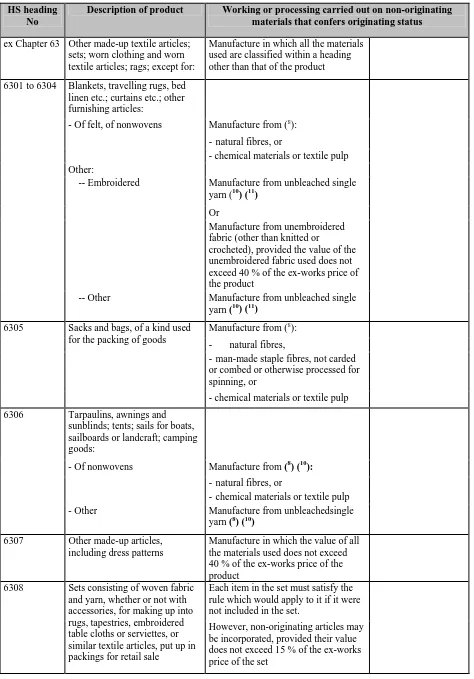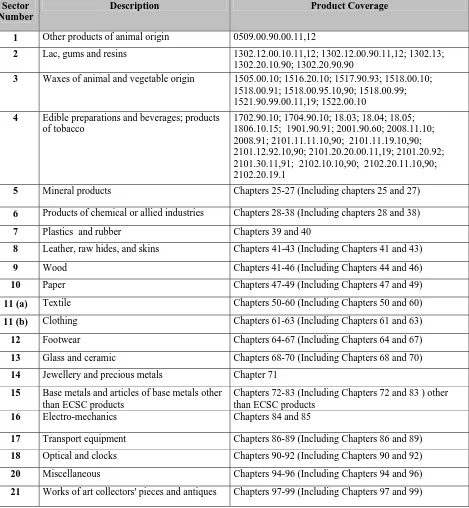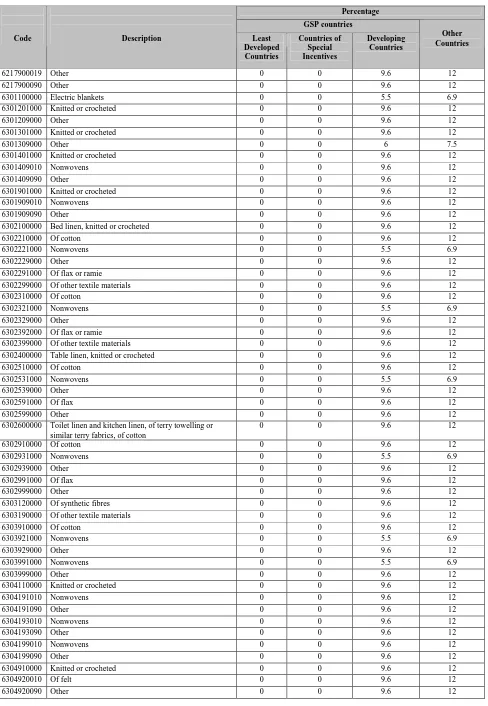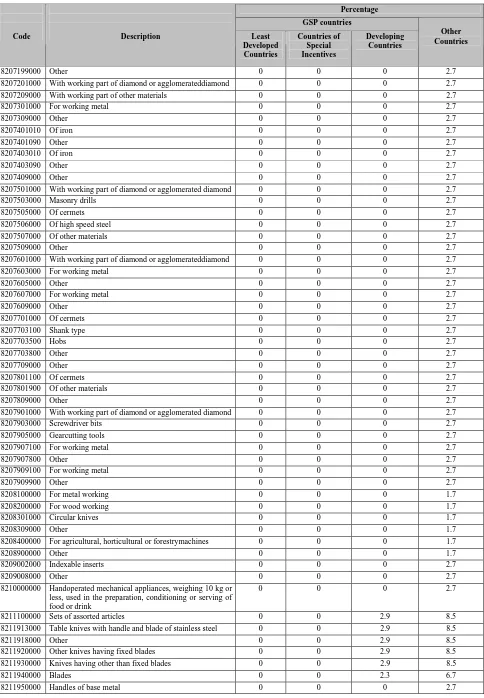UNITED NATIONS CONFERENCE ON TRADE AND DEVELOMENT
Generalized System of Preferences
HANDBOOK ON THE SCHEME OF TURKEY
Disclaimer
This designation employed and the presentation of the material in this publication do not
imply the expression of any opinion whatsoever on the part of the Secretariat of the United
Nations concerning the legal status of any country, territory, city or area or of its authorities,
or concerning the delimitation of its frontiers or boundaries.
Preface
This handbook is a part of a series of publications aimed at helping exporters, producers and
government officials to utilize the trade opportunities available under the various GSP
schemes. The series comprises the following publications:
Publications in the Generalized System of Preferences series
•
Handbook on the Scheme of Australia (UNCTAD/ITCD/TSB/Misc.56)
•
Handbook on the Scheme of Bulgaria (UNCTAD/ITCD/TSB/Misc.67)
•
Handbook on the Scheme of Canada (UNCTAD/ITCD/TSB/Misc.66)
•
Handbook on the Scheme of the European Community
(UNCTAD/ITCD/TSB/Misc.25/Rev.2)
•
Handbook on the Scheme of Japan (UNCTAD/ITCD/TSB/Misc.42/Rev.3)
•
Handbook on the Scheme of New Zealand (UNCTAD/ITCD/TSB/Misc.48)
•
Handbook on the Scheme of Norway (UNCTAD/ITCD/TSB/Misc.29/Rev.1)
•
Handbook on the Scheme of Switzerland (UNCTAD/ITCD/TSB/Misc.28/Rev.1)
•
Handbook on the Scheme of Turkey (present volume)
•
Handbook on the Scheme of the USA (UNCTAD/ITCD/TSB/Misc.58)
•
List of GSP Beneficiaries (UNCTAD/ITCD/TSB/Misc.62/Rev.2)
•
AGOA: A preliminary Assessment (UNCTAD/ITCD/TSB/2003/1)
•
Negotiating Anti-Dumping and Setting Priorities Among Outstanding Issues in the
Post-Doha Scenario: A First Examination in the Light of Recent Practice and DSU
Jurisprudence (UNCTAD/ITCD/TSB/Misc.72)
•
Quantifying the benefits obtained by developing countries from the GSP
(UNCTAD/ITCD/TSB/Misc.52)
•
Trade Preferences for LDCs: An Early Assessment of Benefits and Possible
Improvement (UNCTAD/ITCD/TSB/2003/8)
For further information, please contact:
Ms. M. Mashayekhi
Head
Trade Negotiations and Commercial Diplomacy Branch
Division on International Trade in Goods and Services, and Commodities
United Nations Conference on Trade and Development
Palais des Nations
CH 1211 Geneva 10
Switzerland
Tel:
(+41 22) 917 5866; 917 4944
Fax:
(+41 22) 917 0044
E-mail:
gsp@unctad.org
Notes
The handbook on the Generalized System of Preferences (GSP) of Turkey has been prepared
by the UNCTAD secretariat based on the information provided by the Government of Turkey
in order to provide the general explanation of the scheme for officials and users who are in
charge of the GSP.
For further information on the GSP scheme of Turkey, readers are invited to contact:
Undersecertariat of Foreign Trade
Directorate of Imports
Inonu Bulv. No: 36, 06510 Emek, Ankara
Phone: +90 312 204 75 67 / +90 312 204 77 98
Fax: +90 312 212 87 65
E-mail: tasyurekh@dtm.gov.tr; berkerv@dtm.gov.tr
Contact Persons:
İ
smail Volkan Berker, Head of Section, Halil Serdar Ta
ş
yürek, Assistant
Foreign Trade Specialist
Undersecretariat of Customs
Directorate General for the EU and External Relations
Hükümet Meydani No.1
06100 Ulus
ANKARA
Phone: +90 312 306 82 86 / 306 80 80 / 306 80 83
Fax: +90 312 309 37 37
e-mail: bturel@gumruk.gov.tr
Contact person:
Contents
Page
Part I: General information on the GSP scheme of Turkey
Explanatory notes………..
1
1. Beneficiaries………
1
2. Product
coverage………. 1
3.
Depth of tariff cuts for GSP products……….
2
4. Graduation
mechanism
(country/sector)………. 2
Table
Table 1:
List of Turkey's GSP beneficiary countries and territories………...
3
Part II: Rules of origin under the GSP scheme of Turkey
1. Explanatory
notes……….
7
1.1.
Origin
criteria………
8
1.2.
Direct
consignment………... 11
1.3.
Documentary
evidence………. 11
2.
Consolidated decision on determination of origin of goods benefiting from preferential
regime for the purposes of the GSP………..
13
Annexes
Annex I:
Introductory notes to the list in Annex II………...
37
Annex II:
List of working or processing required to be carried out on non-originating
materials in order that the product manufactured can obtain originating status....
45
Annex III:
Certificate of origin, Form A……….
113
Annex IV:
Movement certificate EUR.1 and application for movement certificate EUR.1...
119
Annex V:
Invoice declaration……….
127
Annex VI:
Working excluded from the Generalized System of Preferences, regional
cumulation……….
129
Annex VII:
List of the least developed
countries……….
131
Part III: List of products covered under the GSP scheme of Turkey
Table 1:
List of products covered under the GSP scheme of Turkey, by sectors…………
133
PART I:
GENERAL INFORMATION ON THE GSP OF TURKEY
Explanatory Notes
The Generalized System of Preferences (GSP) aims at contributing to the economic
development of developing countries. GSP provides benefits to developing countries by
enabling qualified products to enter the markets of preference-giving countries at changing
rates from duty free to reductions in the MFN rate.
Turkey applied for association with the European Economic Community in 1959, one year
after the enforcement of the Treaty of Rome. The Ankara Agreement of 1963 and the
Additional Protocol of 1970 are two important documents which identify modalities and
calendars ensuring the future customs union and confirm the ultimate aim of full membership.
The customs union covering industrial products and processed agricultural products which
came into force on 1 January 1996 with Decision No 1/95 of The Turkey - EC
Association Council was an outcome of these calendars.
Article 16 of Decision No 1/95 of the Association Council states that “With a view to
harmonizing its commercial policy with that of the EC, Turkey shall align itself progressively
with the preferential customs regime of the EC within five years as from the date of entry into
force of this decision. This alignment will concern both autonomous regimes and preferential
agreements with third countries.”
Within this context, Turkey initiated a Generalized System of Preferences by harmonizing
with the EC’s GSP on 1 January 2002 and extended the system with the view of aiming to
align itself fully with the EC’s GSP scheme in the consecutive years. With the 2006 import
regime put into force at the beginning of the year, full aligment with the EC’s GSP scheme
has been achieved
.
1. Beneficiaries
Turkey grants preferential treatment to selected countries and territories which are classified
as developing countries and least developing countries by the World Bank in line with the EC
(see tables 1 and 2).
Beneficiary countries are announced annually in Annexes of the Import Regime Decree.
2. Product
coverage
Preferences are granted for all industrial products and certain agricultural products covered by
the EC’s GSP scheme. (See table 3).
While all customs
duties on products covered by Turkey's GSP scheme have been suspended
for the countries benefiting from the special incentive arrangements in line with the EC’s GSP
scheme, customs duties have been suspended or reduced in accordance with sensitivities of
the products covered by the GSP for developing countries.
3.
Depth of tariff cuts for GSP products
Preferences are differentiated according to the sensitivity of the products fully in harmony
with the EC’s. It is sufficient to differentiate between two product categories, namely
non-sensitive and non-sensitive products.
Tariff duties on non-sensitive products are entirely suspended, while duties on sensitive
products are subject to tariff reductions (3.5 points for ad valorem duties and 30 per cent for
specific duties)
.
Finally, Turkey adopted the same tariff duties with the EC, neither higher nor lower, for GSP
products.
Turkey has reserved the right to suspend preferential treatment for GSP products under certain
circumstances.
4.
Graduation mechanism (Country/Sector)
Turkey applied the graduation mechanism for the list concerned in line with the EC’s
application (see tables 3 and 4).
Table 1
A.
List of Turkey's GSP beneficiary countries and territories
Countries
Sectors Excluded
United Arab Emirates
Antigua and Barbuda
Anguilla
Netherlands Antilles
AQ Antarctica
Argentina
American Samoa
Aruba
Azerbaijan
Barbados
Bahrain
Bermuda
Brunei Darussalam
Botswana
Brazil
4 ; 9
Bahamas
Bouvet Island
Belarus
Belize
Cocos Islands (or Keeling Islands)
Congo
Côte d'Ivoire
Cook Islands
Chile
Cameroon
People's Republic of China
6; 7; 8; 9; 10; 11(a); 11(b); 12; 13; 14; 15; 16; 17; 18; 20
Cuba
Christmas Islands
Dominica
Dominican Republic
Algeria 5
Egypt
Fiji
Falklands Islands
Federated States of Micronesia
Gabon
Grenada
Ghana
Gibraltar
Greenland
South Georgia and South Sandwich Islands
Guam
Guyana
Heard and McDonald Islands
Indonesia
3; 9
India
11(a); 14
Countries
Sectors Excluded
Iran (Islamic Republic of)
Jamaica
Jordan
Kenya
Kyrgyzstan
St Kitts and Nevis
Kuwait
Cayman Islands
Kazakhstan
Lebanon
St Lucia
Libyan Arab Jamahiriya
Morocco
Marshall Islands
Macau
Northern Mariana Islands
Montserrat
Mauritius
Mexico
Malaysia
3
Namibia
New Caledonia
Norfolk Island
Nigeria
Nauru
Niue Island
Oman
French Polynesia
Papua New Guinea
Philippines
Pakistan
St Pierre and Miquelon
Pitcairn
Palau
Paraguay
Qatar
Russian Federation
6; 10; 15
Saudi Arabia
Seychelles
Santa Helena
Suriname
Syrian Arab Republic
Swaziland
Turks and Caicos Islands
French Southern territories
Thailand
14; 17
Tajikistan
Tokelau
Tonga
Trinidad and Tobago
Countries
Sectors Excluded
Uruguay
Uzbekistan
St Vincent and Northern Grenadines
Virgin Islands (British)
Virgin Islands (USA)
Viet Nam
Wallis and Futuna Islands
Mayotte
South Africa
17
Zimbabwe
B.
Beneficiary Countries of Special Incentive Arrangements
Bolivia Mongolia
Ecuador
Moldova (Republic of)
El Salvador
Nicaragua
Guatemala
Panama
Georgia Peru
Honduras
Sri Lanka
Colombia
Venezuela
Costa Rica
C.
Least Developed Countries (LDCs)
Afghanistan
Malawi
Angola Maldives
Bangladesh Mali
Benin
Mauritania
Bhutan
Mozambique
Burkina Faso
Myanmar*
Burundi
Nepal
Cape Verde
Niger
Djibouti
Central African Republic
Chad
Rwanda
Equatorial Guinea
Samoa
Eritrea
São Tomé and Príncipe
Ethiopia
Senegal
Gambia
Sierra Leone
Guinea
Solomon Islands
Guinea-Bissau
Somalia
Haiti
Sudan
Cambodia
Timor-Leste
Kiribati
Tanzania (United Republic of)
Comoros
Togo
Democratic Republic of Congo
Tuvalu
Lao People's Democratic Republic
Uganda
Lesotho
Vanuatu
Liberia
Yemen
Madagascar Zambia
* The preferences in all chapters granted under GSP are suspended for a temporary period for Myanmar. The
RULES OF ORIGIN UNDER THE GSP SCHEME OF TURKEY
1. Explanatory notes
In the context of the Generalized System of Preferences, Turkey has granted tariff preferences
to the beneficiary countries
1as from 1 January 2002 as a result of the customs union between
Turkey and the European Community which is based on Association Council Decision No
1/95 between Turkey and the European Community.
The rules of origin are regulated by the “Decision on Determination of Origin of Goods
Benefiting from Preferential Regime for the Purposes of the Generalised System of
Preferences No. 2001/3485” (hereinafter referred to as "Decision") which was published in
the Turkish Official Gazette on 30 December 2001 and amended by the Decisions which
were published in the Official Gazette of the Republic of Turkey on 9 October 2003/25254
and 20 March 2004/25408)
The Decision regulates the procedures and principles for determining the origin of goods
benefiting from the preferential regime at trade with Turkey for the purposes of the
Generalized System of Preferences. The provisions of the Decision are in accordance with the
ones of the “Commission Regulation No 1602/2000 amending Regulation No. 2454/93 laying
down provisions for the implementation of Council Regulation No 2193/92 establishing the
Community Customs Code” and Commission Regulation No 881/2003 of 21 May 2003.
Goods to benefit from preferential treatment under the Turkish GSP scheme must meet the
following main three requirements:
1.
The exporting country must be designated as the beneficiary country;
2.
The product must be eligible for the GSP treatment; and
3.
The product must meet the origin criteria.
Concerning the origin criteria, goods exported from the beneficiary country to Turkey must
comply with the requirements of rules of origin if they are to benefit from the preferential
tariff treatment, provided that they are under the GSP scheme. Goods not complying with the
rules of origin requirements will be denied preferential treatment and the normal duty rate will
apply to these goods.
The rules of origin under the Turkish GSP scheme comprise the following elements:
¾
Origin Criteria
¾
Direct Consignment
¾
Documentary Evidence
1




